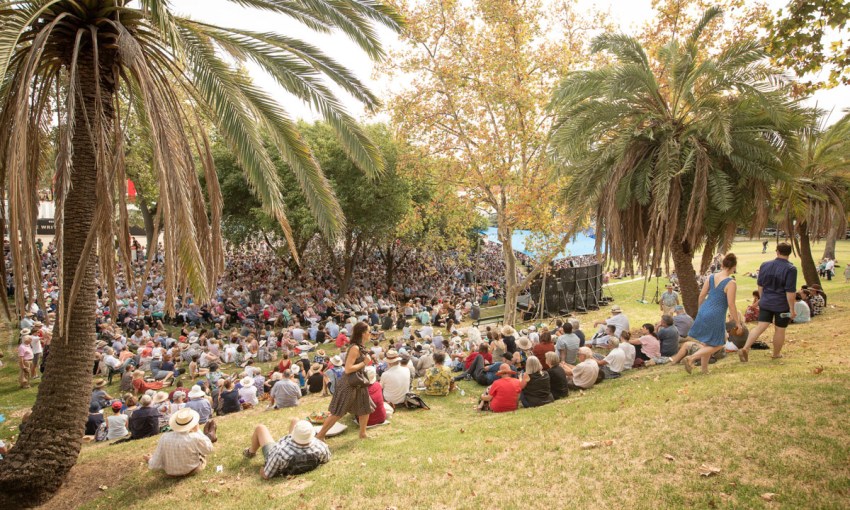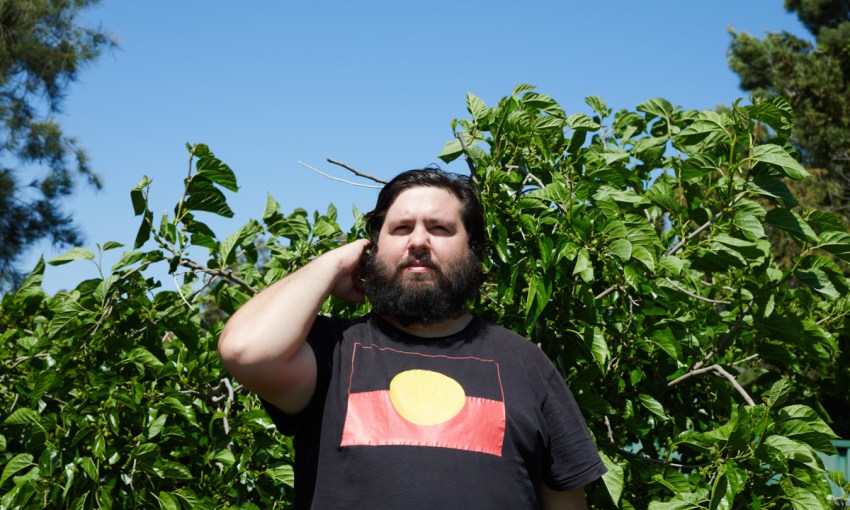Ngarrindjeri and Kaurna poet Dominic Guerrera will appear at First Nations spoken word event First Words at Writers' Week this weekend, and says Indigenous representation is sorely lacking in Australian literary festivals.
First Words puts Aboriginal poetry centre-stage at Writers’ Week
Dominic Guerrera is a CityMag regular. We’ve covered the Ngarrindjeri and Kaurna person’s curated art exhibition, circles to us, at Nexus Arts, as well as Sovereign Soil, the Two Wells farm they run with agricultural partner Holly Giblin.
First Words
1pm Sunday, 28 February
Pioneer Women’s Memorial Garden
King William Street, Adelaide 5000
Browse the full Writers’ Week program here.
Dominic is an Aboriginal Health Worker and an active member of Australia’s literary scene, taking part in spoken word and poetry nights such as Draw Your (S)words, and publishing work in literary journals like Cordite.
This Sunday, 28 February, Dominic and another six local Indigenous poets will perform spoken word poetry as part of Adelaide Writers’ Week event First Words, presented by SA’s peak literary organisation, Writers SA.
“First Words features all Aboriginal poets who are local to South Australia,” Dominic tells CityMag.
“It has a varying degree of people who are high profile, like Ali Cobby Eckermann; to people who have been writing poetry for a long time, like Mandy Brown; and people who are emerging, like myself, and then even Steven Pappin who is someone who has not really done an event like this before.”
Dominic will contribute a range of pieces to the event and highlights to us a work titled Reconciliation Clap Along, where he asks for non-Indigenous people to clap along to lines while questioning their alliances with certain social movements.
“One example is a voice to parliament, or the Uluru Statement [from the Heart], or reconciliation,” Dominic says.
“These are movements I personally think are about assimilating Aboriginal people into the colony of Australia.”
Dominic says “it’s really great” to see so many Aboriginal writers under one roof for First Words because this representation has long been lacking at Australian literary festivals.
First Nations writers in the 2021 Writers’ Week program include Nardi Simpson, Karen Wyld, Jared Thomas and A.B Original musician Briggs. Others include the whole First Words troop: Ali Cobby Eckermann, Mandy Brown, Natalie Harkin, Steven Pappin, Celestine Rowe, and coordinator of writing collective South Australians First Nations Group, Edoardo Crismani.
While Dominic believes representation at Writers’ Week has improved in recent years, the problem stems from a discrepancy in opportunity within the broader literary scene.
“A lot of the people who are getting published are white men,” Dominic says.
“Books getting pushed in bookstores are white men. People selling books are white men. And so, they can take up a lot of space in festivals and in bookshops and so forth.
“I know that the JFL Festival, part of the OzAsia Festival, they’re really diverse. They’re an Indian literary festival and a really diverse group of people. It doesn’t really have the clout or the exposure that an Adelaide Writers’ Week does.”

Adelaide Writers’ Week. This picture: Shane Reid
Director of Writers’ Week Jo Dyer tells CityMag First Words is an “amazing lineup of First Nations poets and storytellers” and this year’s bill includes a “mixed but stimulating bag that we hope features something for everyone.”
She says the authors selected for the Writers’ Week program starts with her doing a lot of reading and “careful consideration” before taking options to colleagues and advisors for discussion.
“Most authors in the lineup have recently published books that become the focus of discussion in a particular session, but there are exceptions to this,” Jo says.
“For the session on Cassandra Pybus’s book Truganini, for example, Cassandra is joined by Palawa Elder and senior bureaucrat Ian Anderson, and academic Chongyi Feng joins Geoff Raby for the discussion triggered by Geoff’s book, China’s Grand Strategy and Australia’s Future in the New Global Line Up.
“The session on the Murray Darling Basin includes authors on the subject – Richard Beasley and Margaret Simons – as well as Grant Rigney, the Director of the Murray Lower Darling Rivers Indigenous Nations.”
Jessica Alice is the director of not-for-profit organisation Writer’s SA and says publishing can be a “pretty opaque industry” that’s made worse with barriers like racism and class.
“It’s an issue at every level of the national literary ecology, from publishers, editors and agents, to festival lineups and in audiences,” she says.
“So Writers SA is particularly enthusiastic about presenting events like First Words, and supporting talented groups like the SA First Nations Writers to make literary culture more representative and more accessible.”
Dominic’s poetry is as personal as it is political, and says the reason the art form is important is it connects songs to storylines, and brings him closer to his grandmother, Margaret Brushahan.
“She’s an aboriginal writer who was published,” Dominic says.
“She launched her first collection of poetry, Raukkan, with Magabala Books, I believe was in the late ’80s early-’90s. There’s a few people who write poetry in the family and I think it comes from her.”
Find out more about First Words here. Browse the full Adelaide Writers’ Week program here.




